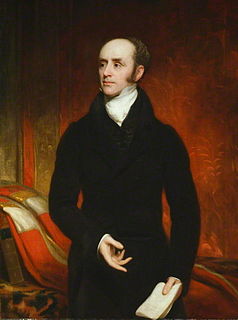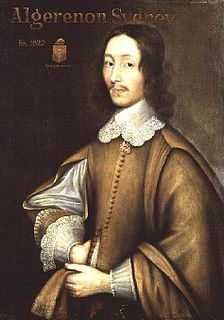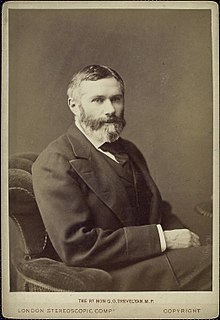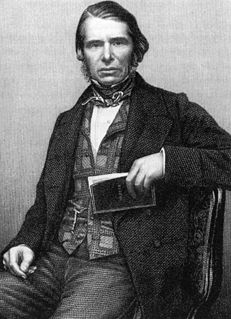Related Research Articles
The Whigs were a political faction and then a political party in the Parliaments of England, Scotland, Ireland, Great Britain and the United Kingdom. Between the 1680s and the 1850s, the Whigs contested power with their rivals, the Tories. The Whigs merged into the new Liberal Party in the 1850s, and other Whigs left the Liberal Party in 1886 to form the Liberal Unionist Party, which merged into the Liberals' rival, the modern day Conservative Party, in 1912.

Charles James Fox, styled The Honourable from 1762, was a prominent British Whig statesman whose parliamentary career spanned 38 years of the late 18th and early 19th centuries. He was the arch-rival of the Tory politician William Pitt the Younger; his father Henry Fox, 1st Baron Holland, a leading Whig of his day, had similarly been the great rival of Pitt's famous father, William Pitt, 1st Earl of Chatham.

General John Churchill, 1st Duke of Marlborough, 1st Prince of Mindelheim, 1st Count of Nellenburg, Prince of the Holy Roman Empire, was an English soldier and statesman whose career spanned the reigns of five monarchs. From a gentry family, he served first as a page at the court of the House of Stuart under James, Duke of York, through the 1670s and early 1680s, earning military and political advancement through his courage and diplomatic skill.

Thomas Babington Macaulay, 1st Baron Macaulay, was a British historian and Whig politician, who served as the Secretary at War between 1839 and 1841, and as the Paymaster-General between 1846 and 1848.

Sir John Wildman was an English politician and soldier.

George Macaulay Trevelyan was a British historian and academic. He was a Fellow of Trinity College, Cambridge, from 1898 to 1903. He then spent more than twenty years as a full-time author. He returned to the University of Cambridge and was Regius Professor of History from 1927 to 1943. He served as Master of Trinity College from 1940 to 1951. In retirement, he was Chancellor of Durham University.

Charles Grey, 2nd Earl Grey,, known as Viscount Howick between 1806 and 1807, was a British politician who served as Prime Minister of the United Kingdom from 1830 to 1834. He was a descendant of the noble House of Grey and a member of the Whig Party.

Algernon Sidney or Sydney was an English politician, republican political theorist and colonel. A member of the middle part of the Long Parliament and commissioner of the trial of King Charles I of England, he opposed the king's execution. Sidney was later charged with plotting against Charles II, in part based on his most famous work, Discourses Concerning Government, which was used by the prosecution as a witness at his trial. He was executed for treason. After his death, Sidney was revered as a "Whig patriot—hero and martyr".
Whig history is an approach to historiography that presents history as a journey from an oppressive and benighted past to a "glorious present". The present described is generally one with modern forms of liberal democracy and constitutional monarchy: it was originally a satirical term for the patriotic grand narratives praising Britain's adoption of constitutional monarchy and the historical development of the Westminster system. The term has also been applied widely in historical disciplines outside of British history to describe "any subjection of history to what is essentially a teleological view of the historical process". When the term is used in contexts other than British history, "whig history" (lowercase) is preferred.

John Somers, 1st Baron Somers, was an English Whig jurist and statesman. Somers first came to national attention in the trial of the Seven Bishops where he was on their defence counsel. He published tracts on political topics such as the succession to the crown, where he elaborated his Whig principles in support of the Exclusionists. He played a leading part in shaping the Revolution settlement. He was Lord High Chancellor of England under King William III and was a chief architect of the union between England and Scotland achieved in 1707 and the Protestant succession achieved in 1714. He was a leading Whig during the twenty-five years after 1688; with four colleagues he formed the Whig Junto.

Sir George Otto Trevelyan, 2nd Baronet, was a British statesman and author. In a ministerial career stretching almost 30 years, he was most notably twice Secretary for Scotland under William Ewart Gladstone and the Earl of Rosebery. He broke with Gladstone over the 1886 Irish Home Rule Bill, but after modifications were made to the bill he re-joined the Liberal Party shortly afterwards. Also a writer and historian, Trevelyan wrote his novel The Competition Wallah in around 1864, and The Life and Letters of Lord Macaulay, his maternal uncle, in 1876.

Catharine Macaulay, later Catharine Graham, was an English Whig republican historian.

Sir Charles Edward Trevelyan, 1st Baronet, was a British civil servant and colonial administrator. As a young man, he worked with the colonial government in Calcutta, India. He returned to Britain and took up the post of Assistant Secretary to the Treasury. During this time he was responsible for facilitating the government's inadequate response to the Irish famine. In the late 1850s and 1860s he served there in senior-level appointments. Trevelyan was instrumental in the process of reforming the British Civil Service in the 1850s.
Dr Leslie Mitchell MA, DPhil, FRHistS is an academic historian specialising in British history.
The Whig Junto is the name given to a group of leading Whigs who were seen to direct the management of the Whig Party and often the government, during the reigns of William III and Anne. The Whig Junto proper consisted of John Somers, later Baron Somers; Charles Montagu, later Earl of Halifax; Thomas Wharton, later Marquess of Wharton, and Edward Russell, later Earl of Orford. They came to prominence due to the favour of Robert Spencer, 2nd Earl of Sunderland and during the reign of Queen Anne, Sunderland's son, the 3rd Earl succeeded his father. Opponents gave them the nickname "the five tyrannising lords". Other figures prominent around the edges of the Junto include Sir John Trenchard and Thomas Tollemache.
The History of England from the Accession of James the Second (1848) is the full title of the five-volume work by Lord Macaulay (1800–1859) more generally known as The History of England. It covers the 17-year period from 1685 to 1702, encompassing the reign of James II, the Glorious Revolution, the coregency of William III and Mary II, and up to William III's death.
Sir John Dalrymple of Cousland, 4th Baronet FRSE FSA(Scot) was a Scottish advocate, judge, chemist and author, best known for his Memoirs of Great Britain and Ireland from the dissolution of the last parliament of Charles II until the sea battle of La Hogue, first published in 1771. A new edition of 1790 carried on to the capture of the French and Spanish navies at Vigo. The Dalrymples formed a dynasty in the Scottish legal profession. Though he was a central figure in the Scottish Enlightenment and a friend of persons like David Hume and Adam Smith, Dalrymple's writings were little appreciated – he has been seen as an irritating member of the Edinburgh literati.

The History of the Rebellion by Edward Hyde, 1st Earl of Clarendon and former advisor to Charles I and Charles II, is his account of the Wars of the Three Kingdoms. Originally published between 1702 and 1704 as The History of the Rebellion and Civil Wars in England, it was the first detailed account from a key player in the events it covered.
The historiography of the United Kingdom includes the historical and archival research and writing on the history of the United Kingdom, Great Britain, England, Scotland, Ireland, and Wales. For studies of the overseas empire see historiography of the British Empire.
References
- Charles Harding Firth, A Commentary on Macaulay's History of England (London: Frank Cass, 1964).
- L. G. Mitchell, Charles James Fox (London: Penguin, 1997).
- Loren Reid, Charles James Fox. A Man for the People (London: Longmans, 1969).
- George Otto Trevelyan, The Life and Letters of Lord Macaulay. Volume I (Oxford University Press, 1978).